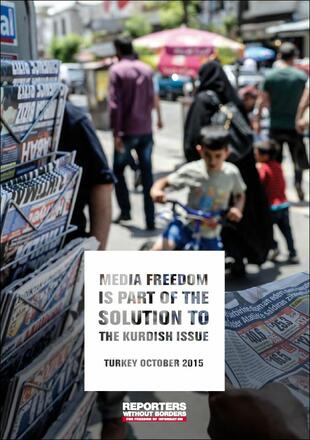
Media Freedom and the Kurdish issue
The Kurdish minority, constituting 15% of the population in Turkey, has been systematically denied linguistic and cultural rights as well as representation in the public discourse. The crackdown against journalism goes hand in hand with the repression of national minorities which has long characterized Turkish politics, turning the Kurdish and Armenian issues into national taboos.
The report traces the development of attacks on media freedom and repression against pro-Kurdish outlets since the 1980s, highlighting the strategies deployed against pro-Kurdish outlets and to remove the Kurdish question from the public debate, such as harsh censorship, legal measures enforced by special courts, high penalties for the questionable crime of “separatist propaganda” and “terrorist propaganda” and extra-judicial executions against journalists. The study then considers how the repression of the 1990s spawned resistance and the creation of a press focused on the Kurdish issue.
For two years (2013 -2015) in which a truce halted the clashes between the government forces and the PKK in Turkey, media outlets were finally able to discuss the Kurdish question; attacks and prosecutions of those tackling this issue became less frequent, and dozens of imprisoned Kurdish journalists were granted conditional releases. But this process has been quickly reversed as clashes resumed in July 2015.
As soon as the peace process was abandoned, censorship ans self-censorship on the Kurdish issue quickly reappeared, with the blocking of around 100 news websites (65 of which, Kurdish) already in July 2015. Draconian censorship is now being applied to all the media on the grounds of combating terrorism; the war on PKK is the argument adopted to justify any new offensive against critical media.
Media freedom and pluralism, as the bases for democratic debate, would strongly contribute to the solution to the Kurdish question. Freedom of information would play a key role in this sense, allowing Turkish citizens to adopt informed positions on this matter. On the contrary, as long as clashes continue, the government attitude is to feed the feelings of paranoia and obsession and further extend its control on media in the country.
Tags: Turkey Media freedom CensorshipThe content of this article can be used according to the terms of Creative Commons: Attribution-NonCommercial 4.0 International (CC BY-NC 4.0) . To do so use the the wording "this article was originally published on the Resource Centre on Media Freedom in Europe" including a direct active link to the original article page.

